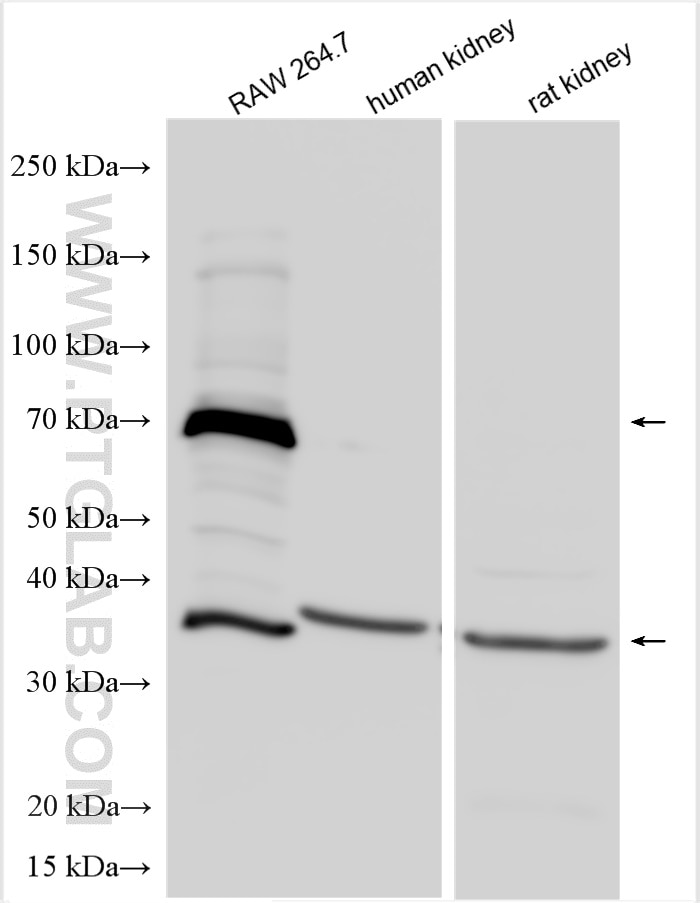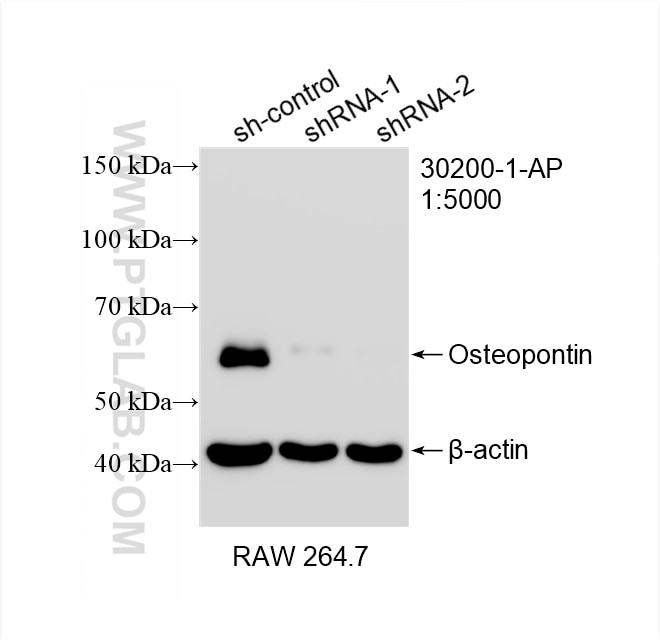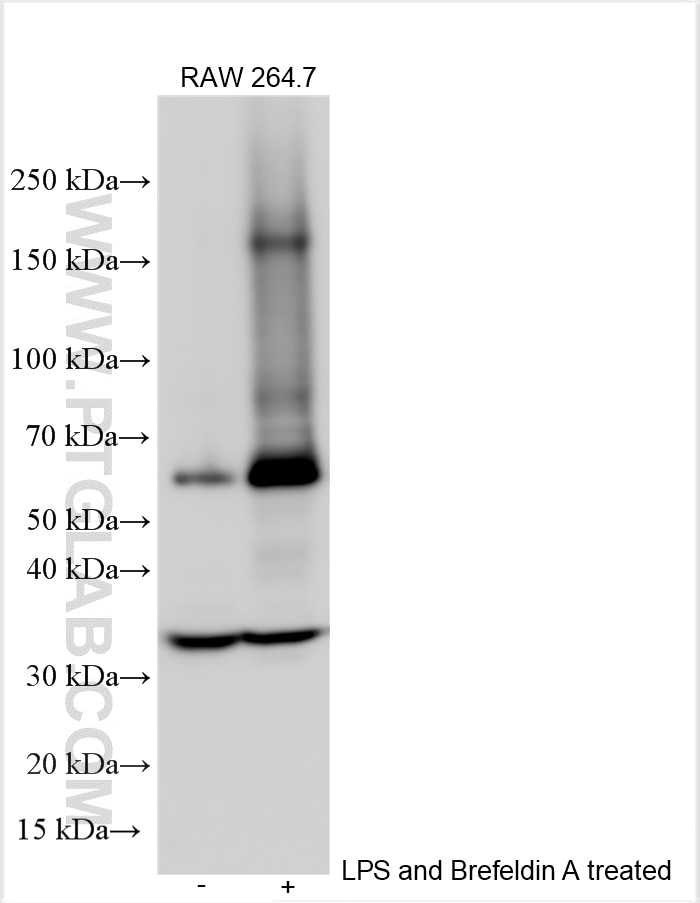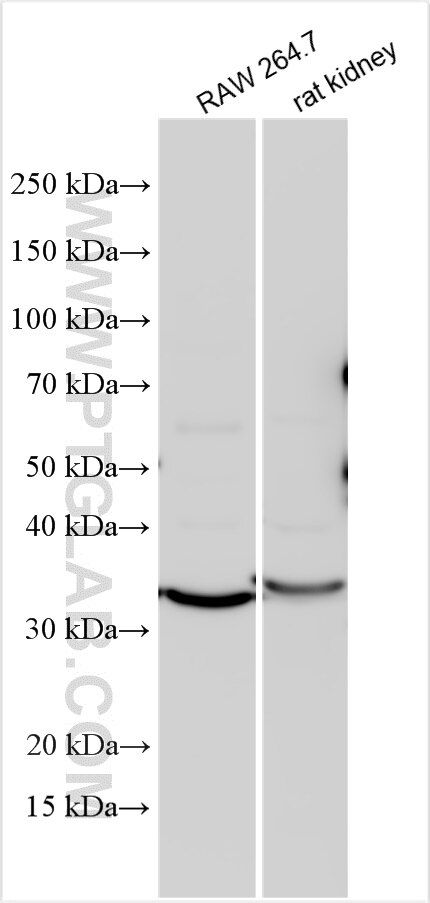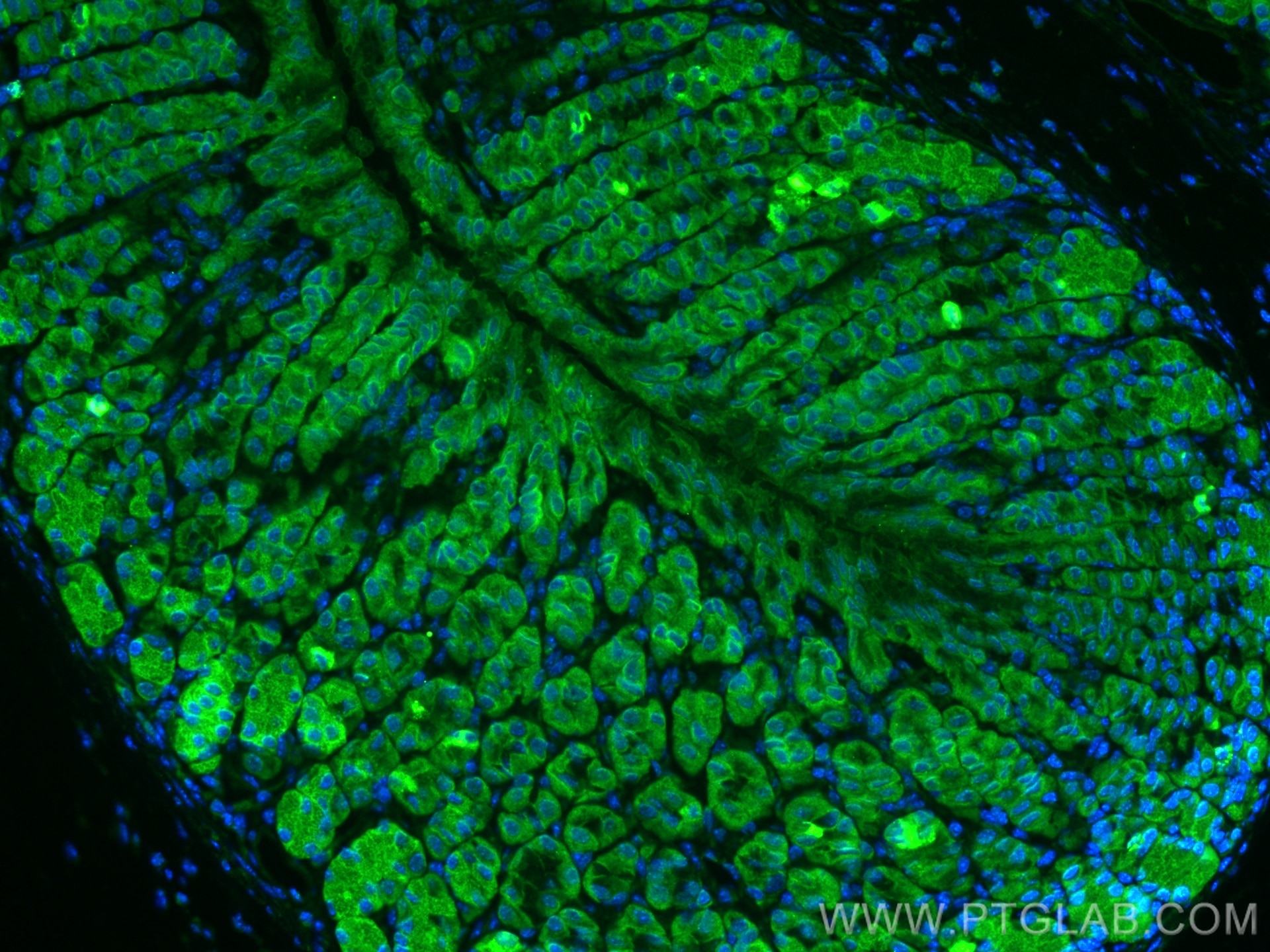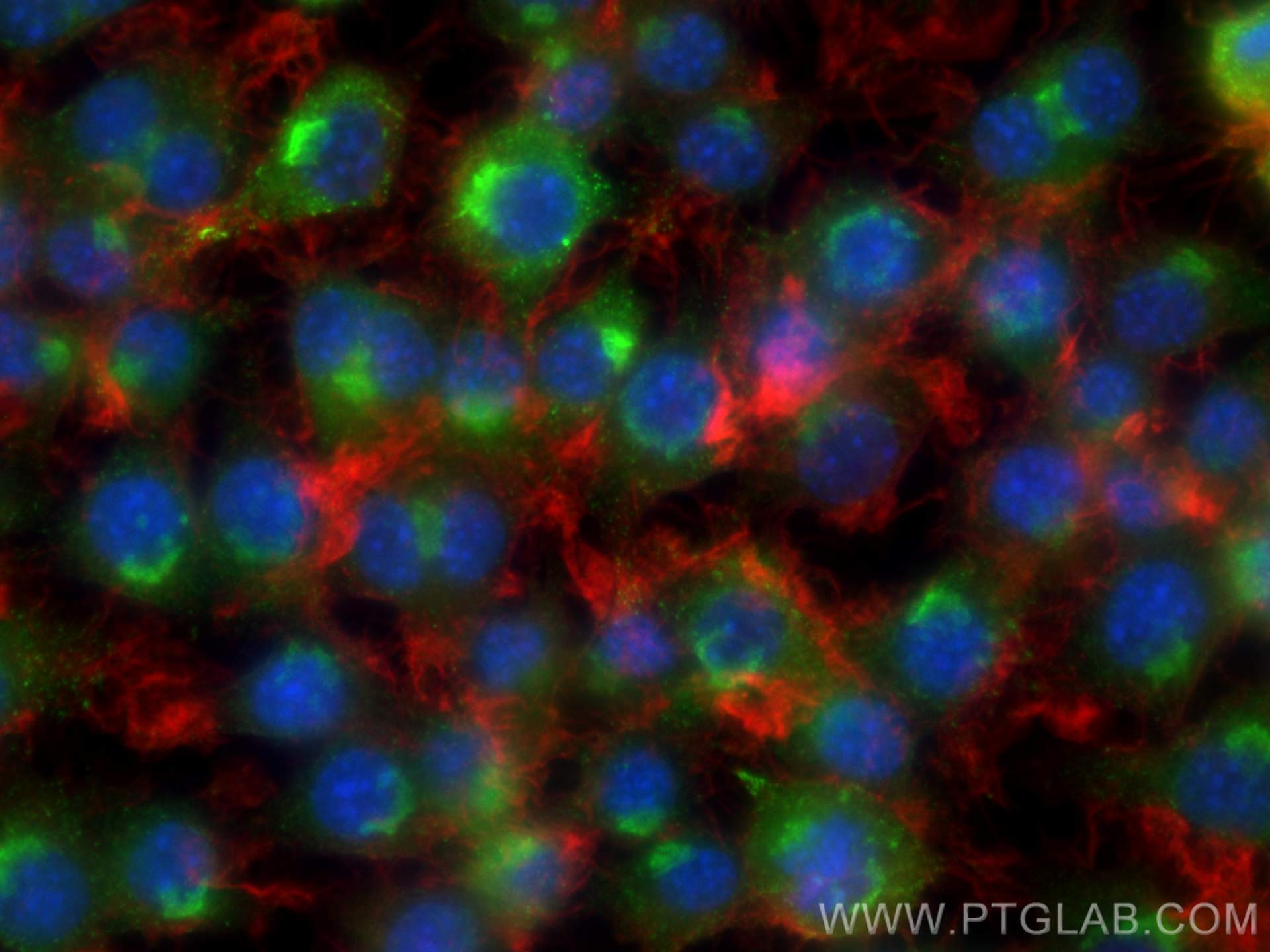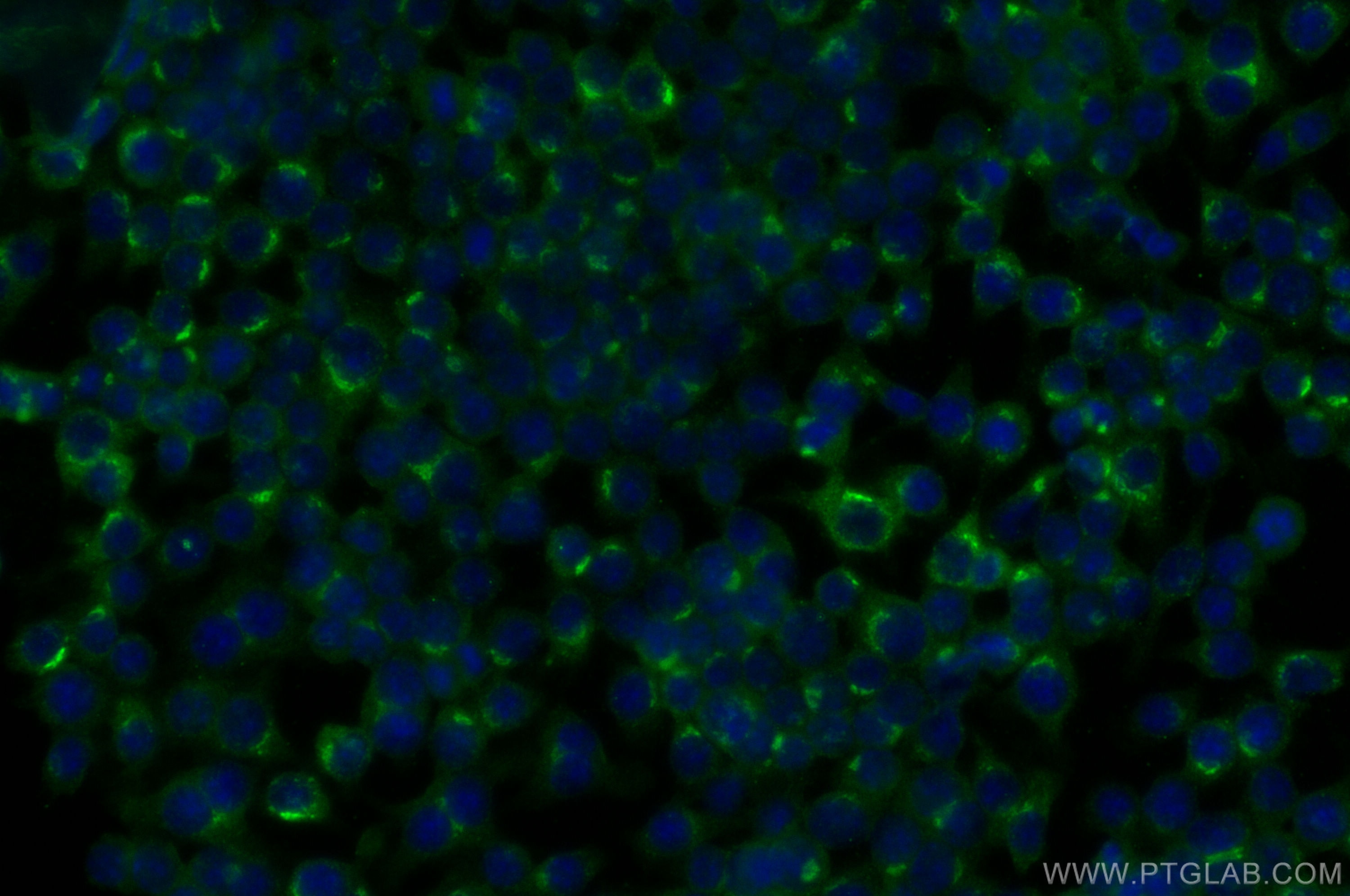- Featured Product
- KD/KO Validated
Osteopontin Polyklonaler Antikörper
Osteopontin Polyklonal Antikörper für WB, IF/ICC, IF-P, ELISA
Wirt / Isotyp
Kaninchen / IgG
Getestete Reaktivität
human, Maus, Ratte
Anwendung
WB, IHC, IF/ICC, IF-P, ELISA
Konjugation
Unkonjugiert
Kat-Nr. : 30200-1-AP
Synonyme
Geprüfte Anwendungen
| Erfolgreiche Detektion in WB | RAW 264.7-Zellen, humanes Nierengewebe, Rattennierengewebe |
| Erfolgreiche Detektion in IF-P | Maus-Magengewebe |
| Erfolgreiche Detektion in IF/ICC | RAW 264.7-Zellen |
Empfohlene Verdünnung
| Anwendung | Verdünnung |
|---|---|
| Western Blot (WB) | WB : 1:1000-1:4000 |
| Immunfluoreszenz (IF)-P | IF-P : 1:50-1:500 |
| Immunfluoreszenz (IF)/ICC | IF/ICC : 1:50-1:500 |
| It is recommended that this reagent should be titrated in each testing system to obtain optimal results. | |
| Sample-dependent, check data in validation data gallery | |
Veröffentlichte Anwendungen
| WB | See 6 publications below |
| IHC | See 1 publications below |
Produktinformation
30200-1-AP bindet in WB, IHC, IF/ICC, IF-P, ELISA Osteopontin und zeigt Reaktivität mit human, Maus, Ratten
| Getestete Reaktivität | human, Maus, Ratte |
| In Publikationen genannte Reaktivität | human, Maus, Ratte |
| Wirt / Isotyp | Kaninchen / IgG |
| Klonalität | Polyklonal |
| Typ | Antikörper |
| Immunogen | Osteopontin fusion protein Eg0317 |
| Vollständiger Name | secreted phosphoprotein 1 |
| Berechnetes Molekulargewicht | 32kd |
| Beobachtetes Molekulargewicht | 32 kDa, 60-70 kDa |
| GenBank-Zugangsnummer | NM_001204233.1 |
| Gene symbol | Osteopontin |
| Gene ID (NCBI) | 20750 |
| Konjugation | Unkonjugiert |
| Form | Liquid |
| Reinigungsmethode | Antigen-Affinitätsreinigung |
| Lagerungspuffer | PBS with 0.02% sodium azide and 50% glycerol |
| Lagerungsbedingungen | Bei -20°C lagern. Nach dem Versand ein Jahr lang stabil Aliquotieren ist bei -20oC Lagerung nicht notwendig. 20ul Größen enthalten 0,1% BSA. |
Hintergrundinformationen
Osteopontin (OPN) is also named as 2AR, minopontin, bone sialoprotein 1, Spp1, Eta-1 and Op, and belongs to the osteopontin family. Osteopontin is major non-collagenous bone protein that binds tightly to hydroxyapatite. It is a highly phosphorylated glycophosphoprotein having acidic characteristics and rich in aspartic acid (PMID: 30003880). And it acts as a cytokine involved in enhancing production of interferon-gamma and interleukin-12 and reducing production of interleukin-10 and is essential in the pathway that leads to type I immunity (PMID:2351930, PMID:10657301). OPN, a multifunctional protein, has important functions on cardiovascular diseases, cancer, diabetes and kidney stone diseases and in the process of inflammation, biomineralization, cell viability and wound healing (PMID: 30003880). Osteopontin (OPN) is a pleiotropic glycoprotein expressed in various cell types in animals and in humans, including bone, immune, smooth muscle, epithelial and endothelial cells. Moreover, OPN is found in kidneys (in the thick ascending limbs of the loop of Henle and in distal nephrons) and urine (PMID:30456594). Osteopontin (OPN) is an acidic 60-70 kDa glycoprotein that is cleaved by proteases to yield 45-kDa and 24-kDa fragments (PMID: 10491621, PMID: 1995615)
Protokolle
| PRODUKTSPEZIFISCHE PROTOKOLLE | |
|---|---|
| WB protocol for Osteopontin antibody 30200-1-AP | Protokoll herunterladen |
| IF protocol for Osteopontin antibody 30200-1-AP | Protokoll herunterladen |
| STANDARD-PROTOKOLLE | |
|---|---|
| Klicken Sie hier, um unsere Standardprotokolle anzuzeigen |
Publikationen
| Species | Application | Title |
|---|---|---|
Int J Biol Macromol Cranial repair-promoting effect of oxidised sodium alginate/amino gelatine injectable hydrogel loaded with deer antler blood peptides | ||
Biomedicines Mechanistic Insights into Salvigenin for Glucocorticoid-Induced Femoral Head Osteonecrosis: A Network Pharmacology and Experimental Study | ||
J Transl Med The surface protein Gbp of Fusobacterium nucleatum inhibits osteogenic differentiation by inactivating the Wnt/β-catenin pathway via binding to Annexin A2 | ||
J Gastrointest Oncol SPP1 promotes tumor progression in esophageal carcinoma by activating focal adhesion pathway | ||
J Orthop Surg Res Uniaxial static strain enhances osteogenic and angiogenic potential under hypoxic conditions in distraction osteogenesis | ||
Osteoarthritis Cartilage M2 macrophages regulate nucleus pulposus cell extracellular matrix synthesis through the OPN-CD44 axis in intervertebral disc degeneration |
